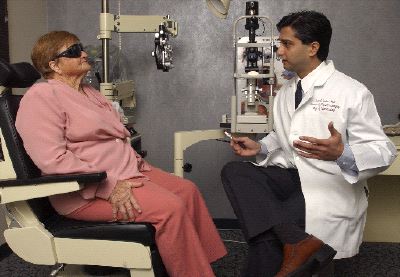FIRST IN FLORIDA
The Australian company, Lions Eye Institute of Western Australia, has selected only a few doctors from around the world-one NRI Dr. is Arun Gulani
Fla. A University of Florida ophthalmologist in Jacksonville became the first in the state to perform two corneal transplants Monday using artificial corneas - the front layer of the eye - that were flown in from Australia.

The two-staged transplant begins by doctors surgically removing a portion of the patient’s damaged cornea, creating a pocket or flap in which the artificial cornea is inserted, explained Dr. Arun Gulani, director of cornea and refractive surgery at the UF Department of Ophthalmology in Jacksonville. The pocket acts as a natural bandage, holding the artificial cornea in place and aiding the healing process.
“I was scared to death, but I didn’t feel one bit of pain,” said Irene Parker, recalling the first stage of the surgery.
The artificial cornea consists of a biocompatible, flexible material specially designed to be accepted by the patient’s remaining tissue and to eventually grow together as one.
It may take up to three months for a patient’s eye to fully incorporate the artificial tissue, but once this has occurred the patient is ready for the second stage. In this stage the flap of native tissue covering the artificial cornea is removed, allowing the patient access to vision.
Parker described her vision prior to the procedure as almost nonexistent. “I couldn’t make out anything… I fell all over everything when I tried to walk.”
Artificial corneas currently are being used only to treat some of the most complex and high-risk cases, in which all other available options have been exhausted. Many of these patients have undergone numerous surgeries, have extensive corneal scarring from an accident or progressive disease, or have rejected a corneal transplant from a human donor.
“This may seem very selective in the type of patients it treats, but the reality is there are so many people across the U.S. waiting for something like this,” said Gulani, who performed the two artificial corneal transplant surgeries on Monday. “I am very excited to offer this surgery in the Jacksonville community.”
The Australian company, Lions Eye Institute of Western Australia, has selected only a few doctors from around the world to perform the procedure based on experience, post-operative results and innovative thinking. The company selected Gulani because of his experience with ocular surface reconstruction, including full and partial corneal transplants using human donor corneas and placenta tissue. He also is known internationally for his development of new instruments and techniques that have improved many eye surgeries. Although Gulani has performed similar procedures numerous times, this marks his first using an artificial cornea. (napa.ufl.edu/2003news/cornealtransp)
In the coming weeks, Gulani will be performing several more of these transplants, which have the approval of the U.S. Food and Drug Administration.
Parker is optimistic about her surgery and the thought of being able to see again. “I hope it works,” she said with a smile.
JACKSONVILLE, FL - The Jacksonville
Business Journal reported a Jacksonville physician hopes to return
sight to patients
by using an artificial cornea for people whose bodies reject or
remain unsuitable for human eye transplants. Dr. Arun Gulani, a
University of Florida ophthalmologist based at Shands Hospital/Jacksonville,
is one of 10 U.S. eye doctors implanting the device. He implanted the
fourth new clear synthetic cornea on Nov. 3, with plans to perform follow-up
surgery to restore patients' vision in a
couple of months. The artificial eye, AlphaCor, is made by Argus Biomedical
Ltd., of Australia. Implanting the contact lens-size device
into patients with corneas damaged by injury or disease costs about $7,000.
The surgery is covered by Medicare but not by private insurance, Dr. Gulani
said.
Click here